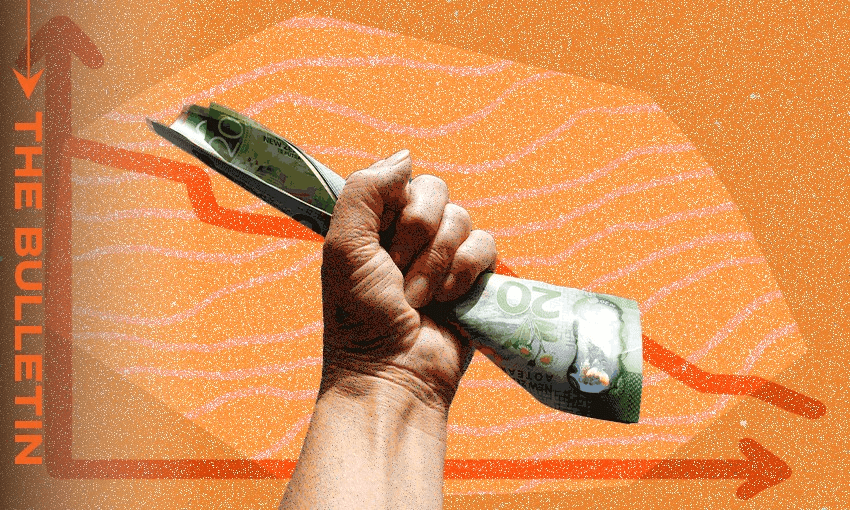Data this morning will reveal whether or not the country has pulled out of recession, writes Stewart Sowman-Lund in this extract from The Bulletin. To receive The Bulletin in full each weekday, sign up here.
Have we escaped recession, and will it even matter?
We’re about to find out if the country is still in an economic recession. At 10.45am, the latest round of Stats NZ data will make the state of the economy a little clearer, though it’s always worth remembering that the figures are instantly out of date given they reflect the period ending three months ago (the data released will cover the March quarter). If the state of the economy has blissfully passed you by, RNZ’s money correspondent Susan Edmunds explains the current downturn and how we ended up here, which makes for quite grim reading.
There’s a whole range of forecasts about what we’ll learn today, but the broad consensus is that there’s no consensus. According to The Post’s Tom Pullar-Strecker, economists are divided on whether or not New Zealand will have pulled out of the technical recession or not. A further retraction, even by a minuscule 0.1%, will mean we haven’t. It wouldn’t mean a lot in real terms, but it would trigger a wave of negative news headlines that does little to improve the general feeling of gloominess. Those predicting economic growth aren’t expecting that to mean much either. The Herald’s Liam Dann wrote that while some banks like ANZ and ASB are forecasting a slight pick-up in activity, a whisker-thin 0.1% or 0.2%, “no one is suggesting the economy is anything other than flat”. But is there any good news?
The road ahead
Today’s figures are just one stop on a longer journey for the economy. Interest’s David Hargreaves reported yesterday on a speech from the Reserve Bank’s chief executive Paul Conway titled “Inflation: the road back to 2%” which looked at our current “slow-to-no-to-negative growth environment”. There was a glimmer of optimism, reported Hargreaves, with Conway predicting continued declines in inflation. The central bank remains committed to its aim of getting inflation back within the 1-3% range by the end of the year. But there’s a long road ahead. Writing earlier in the week, Hargreaves noted that whether or not we’ve pulled out of recession won’t mean a huge amount given the overall flatness of the economy. But, he wrote, “there is a power in that ‘R’ word”. In short, it’s about morale. Recession or not, things feel bad. Duncan Greive communicated that “vibe” better than anyone could back in 2022 in a piece simply titled: “Everything feels bad all the time”.
Given it’s June, that means we are coming to the end of another quarter. While data for that won’t come out for another few months, RNZ’s Gyles Beckford reported that things aren’t looking good for this period either. “The first quarter was flat to negative, and the second quarter doesn’t look like it’s going to be any better, if not worse,” said BNZ’s senior economist Doug Steel. The general expectation remains that we could be waiting until next year for the worm to turn, as Susan Edmunds wrote for Stuff in March.
Perhaps unsurprisingly, one person calling for more drastic action in the face of economic challenges is former Labour minister and Act leader Richard Prebble (a key figure in The Spinoff’s new political podcast, Juggernaut). Writing for the Herald this week, Prebble said a recession was the perfect opportunity for “sweeping deregulation”. It’s food for thought.
Nicola Willis faces a grilling
The person keeping perhaps the closest eye on those numbers later this morning will be the finance minister Nicola Willis, who spent much of yesterday in front of opposition MPs for a post-budget grilling. It’s probably been the most popcorn-worthy of the scrutiny week hearings (patsy questions included), as The Spinoff’s Joel MacManus writes in this colourful report.
While much of Willis’s time was taken up responding to questions over the government’s as-yet-unfulfilled promise to fund new cancer drugs, there were some interesting economic tidbits. Jonathan Mitchell at the NBR (paywalled) looked at that, reporting that Willis acknowledged the economy was in a tough spot, but believed her first budget delivered at the end of last month would help inflation to fall. She cited the government’s emphasis on regulation changes and cutting red tape as a way to encourage job creation in the private sector (while reiterating the intention to keep finding cost savings in the public sector). Another interesting detail picked up by the Herald’s Thomas Coughlan was around charities, with Willis signalling that some could soon pay tax. That was an idea some (The Spinoff’s Toby Manhire included) speculated would form part of National’s pre-election tax plan. It didn’t, but it would still be a bold play now.
Across the ditch
I touched on this yesterday, but it bears repeating: New Zealand isn’t alone in the situation we find ourselves in, even if the avalanche of commentary may sometimes suggest otherwise. In Australia, reported The Guardian this week, the economy has “stalled” while inflation remains stubbornly high. This piece from the Australia Institute compares the economic situations in Australia, the United States and Canada, showing that inflation is largely rising and falling in line. Of course, Australia has avoided recession, and the ABC’s Gareth Hutchens reported that the country’s Reserve Bank governor wasn’t expecting one. Nevertheless, the bank expects it will be “some years” before inflation is sustainably in the target range. Sound familiar?


